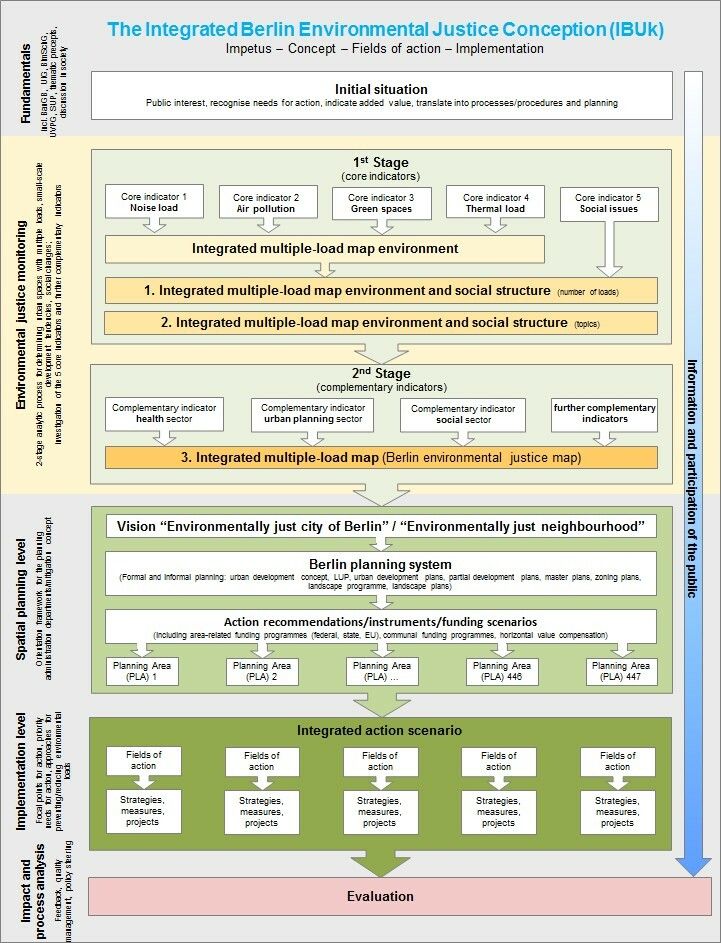The term environmental justice refers to the type, extent and consequences of the unequal social distribution of environmental loads and to its reasons. For a long time, it has been known and scientifically proven that social condition is one of the factors for a person’s health condition and that it influences life expectancy. The relationship between socio-economic status and the residential and residential environment conditions hazardous to health – and their causal relationships – has not been thoroughly examined in Germany so far. Thus a largely health-related risk analysis and evaluation is lacking. This is especially relevant with respect to the development and implementation of integrative strategies, concepts and measures, and it applies particularly to high-density areas.
In order to compile the necessary fundamentals for the goal-oriented development of action strategies related to environmental and health policy, the State of Berlin initiated the cross-departmental space-oriented pilot project “Environmental Justice in Berlin” in 2008. The handling of the individual topics was closely coordinated with the thematically competent Senate departments, the Statistical Office for Berlin-Brandenburg, several universities and independent research institutions. Since 2012, the Federal Environment Agency (Umweltbundesamt, UBA) has specifically supported the development of the new topic and accompanied it with its expertise. The following text is based on the publication Basisbericht 2014/2015 “Umweltgerechtigkeit im Land Berlin, Grundlagen für die handlungsorientierte sozialräumliche Umweltpolitik im Land Berlin” (Basic report 2014/2015 “Environmental Justice in the State of Berlin – Fundamentals for an action-oriented socio-spatial environmental policy in the State of Berlin”) (SenStadtUm 2015, unpublished).
With a view to the development of a cross-departmental health load analysis, the following questions were in the foreground:
- Which environment-related topics are relevant for health and should be integrated into the context of the investigations?
- How can information, data and analytic results from the thematically competent departments Environment, Health, Urban Development, Urban Planning and Social Affairs be aggregated at the level of the 447 planning areas (PLAs) and combined into a new spatial (informal) level of consideration and planning?
- Which planning areas with health-related multiple loads also exhibit a high density of social problems, and which areas with multiple loads are vulnerable areas in terms of climate change and therefore particularly affected?
- Can general statements and policy recommendations be derived for cross-departmental space-oriented planning or administrative action, and can applicable legal instruments be developed on the basis of the small-scale health load analyses which supplement the Berlin planning system?
The new small-scale or neighbourhood-related Berlin approach to environmental justice closes a gap in the existing reporting and monitoring systems by systematically aggregating environmental aspects hazardous to health and condensing them into a new informal level of consideration and a new field of action. The results are “strategic cornerstones” for environmentally just and sustainable development in the State of Berlin. They confer a greater profile and weight on the socio-spatially oriented environmental policy in the capital and underpin the data concerning social structure with the perspective of environment-related health protection.
The four levels
- environmental justice monitoring (small-scale spatial health load analysis),
- spatial level (mitigation concept),
- implementation level (strategies, measures, projects),
- evaluation
together form the Integrated Berlin Environmental Justice Conception (Integrierte Berliner Umweltgerechtigkeitskonzeption, IBUk) (cf. Fig. 1).

